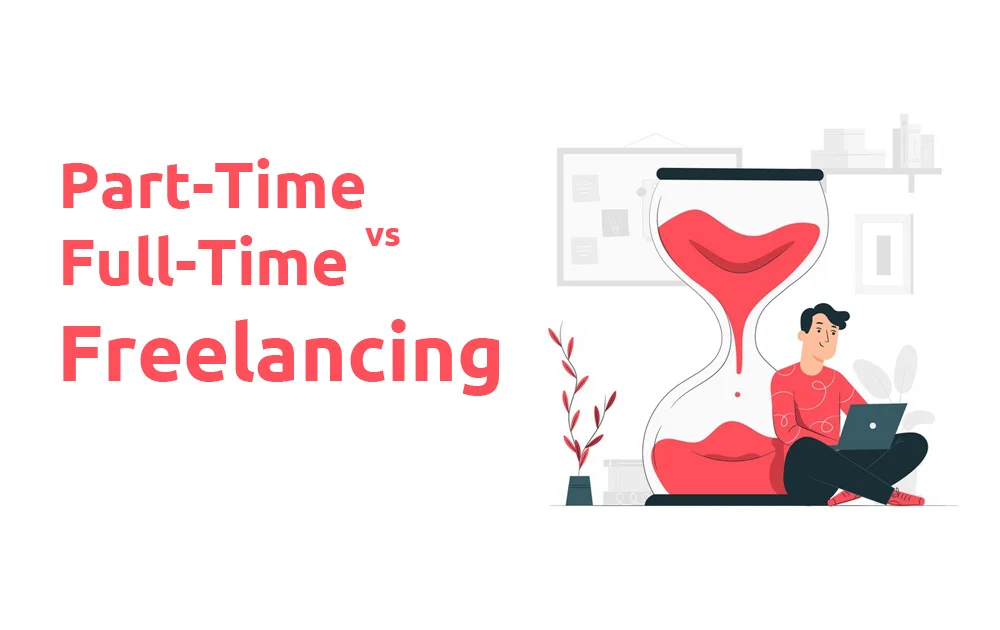In today’s digital age, the traditional 9-to-5 job model is no longer the only path to a successful career. Many professionals are choosing to freelance online, drawn by the flexibility and freedom that comes with it. However, deciding between full-time employment and freelancing can be daunting, especially for those used to the stability of a regular paycheck. This article will explore the key differences between freelancing and full-time work to help you determine if online freelancing is right for you.

- Flexibility vs. Structure
One of the most significant differences between freelancing and full-time work is the level of flexibility. Freelancers can set their own hours, choose their projects, and often work from anywhere. This flexibility allows you to manage your time around other commitments, such as family, hobbies, or travel. For many, this is the biggest appeal of freelancing.
On the other hand, full-time employment offers structure and routine. You know when you’re working, and you typically follow a set schedule, which can make it easier to separate your personal and professional lives. For people who thrive on routine or prefer a structured environment, full-time work may feel more comfortable.
- Income Stability vs. Earning Potential
Full-time employees usually enjoy a steady paycheck, benefits such as health insurance, and sometimes bonuses or retirement plans. This income stability can reduce stress and allow for more predictable financial planning. However, salaries are often capped, and growth can be limited to promotions or yearly raises.
Freelancers, on the other hand, have the potential to earn more based on the work they take on. Your income is directly tied to your workload, and if you can find high-paying clients, your earning potential can surpass that of a traditional job. However, this comes with the challenge of irregular income. Freelancers may experience dry spells where work is scarce, and without benefits or paid time off, this can be stressful.

- Autonomy vs. Team Dynamics
Freelancers operate as their own boss. They decide which projects to take on, set their rates, and manage their own schedule. This level of autonomy is perfect for self-starters who prefer working independently and dislike being micromanaged. However, the downside is that you are responsible for every aspect of your business, from finding clients to handling taxes and dealing with administrative tasks.
In full-time employment, you typically work within a team, often with managers or supervisors guiding you. This setup can foster collaboration and support, giving you access to resources that may not be available as a freelancer. For those who enjoy teamwork and prefer not to handle administrative tasks, full-time work may be more appealing.
- Growth and Learning Opportunities
Full-time positions often come with opportunities for professional growth, including training programs, mentorship, and promotions. Larger companies may offer a clear career path with opportunities to climb the corporate ladder, which can be motivating.
In contrast, freelancers are in charge of their own professional development. While there’s freedom to choose your path, it can be challenging to stay updated with industry trends and skills without the structured training that companies provide. However, freelancers can diversify their skills by taking on different types of projects and clients, which can be rewarding.
- Work-Life Balance
Freelancers often enjoy a better work-life balance due to their ability to create their own schedules. You can take breaks when needed, set boundaries with clients, and even choose to take on fewer projects to prevent burnout. However, many freelancers find themselves working more than expected, especially when deadlines pile up.
Full-time employees may find it easier to disconnect from work after hours, particularly if their employer enforces clear boundaries around working hours. However, some full-time jobs demand long hours, making it difficult to achieve a healthy work-life balance.
Conclusion: Is Freelancing Right for You?
The decision between freelancing and full-time employment comes down to personal preferences, financial goals, and career aspirations. If you value flexibility, autonomy, and have an entrepreneurial spirit, freelancing may be the ideal path. However, if you prefer stability, structure, and a clear growth trajectory, full-time work may be a better fit.
Both paths offer unique benefits and challenges. The key is to assess your priorities and lifestyle to determine which option aligns with your long-term goals. Whether you choose to freelance or stick with full-time work, the most important thing is that it suits your career vision and personal happiness.

